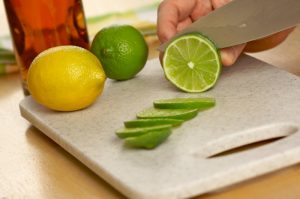 If you’ve gone through cancer treatment, perhaps you worked with a Registered Dietitian (RD) and an exercise specialist for exercise and general eating concerns. Healthful eating, along with being physically active, during treatment can help you keep up your energy level and recover more quickly.
If you’ve gone through cancer treatment, perhaps you worked with a Registered Dietitian (RD) and an exercise specialist for exercise and general eating concerns. Healthful eating, along with being physically active, during treatment can help you keep up your energy level and recover more quickly.
However, side effects like fatigue, nausea and changes in taste can make those healthy habits challenging.
Although RDs don’t need personal experience with cancer treatment to help patients, as we marked Cancer Survivor Day on June 2, I wondered how RDs managed their own cancer treatment. What advice did they follow and what worked well for them?
I asked three RDs to share how they managed eating and physical activity through their own cancer treatment and recovery. Here are their words of wisdom:
Chris Rosenbloom, PhD, RD, CSSD
I gave up running during treatment because the jostling of running was painful after surgery and with skin irritation during radiation. But I turned to walking 2-miles every morning with my dogs. We both enjoyed the quiet time and reflection.
For healthful eating, I also included protein with every meal to aid in healing. I ate an egg every day and included low-fat milk and yogurt with every meal to get high quality protein.
Chris Rosenbloom is an educator, writer and speaker with expertise in health and aging, sports nutrition and wellness.
Diana Dyer, MS, RD
My most helpful tips:
1. Have a friend coordinate meal delivery for you (too much energy needed to do the coordination yourself – this can now be done by several internet programs) and be in charge of returning any dishes/utensils/etc.
2. Have a friend help you clean out your freezer so there is room to put extra food brought by friends
3. Don’t be shy about giving your friends recipes to cook for your family, either family favorites or recipes that include food you can eat
4. Of course all this is prefaced by “Don’t be shy about asking for help. People WANT to help but they want to do things that are actually helpful to you.”
One of the most helpful things to me was a ‘small thing’ done by a friend. I was too weak with platelet counts that were too low to safely cut up lemons and limes to put into my water (to take away/override the metallic taste of everything due to my chemo), so one friend took charge of that small task and once weekly delivered all the lemons and limes I needed for the week already washed and cut up, ready to use. It was a great thing she did for me. That was a perfect example of no task being too small to be helpful or make a difference.
Diana Dyer is a wife, mom, organic farmer and three-time cancer survivor. Learn more in “A Dietitian’s Cancer Story”
Roberta Anding, MS, RD, LD, CDE, CSSD
I took a hard look at my eating habits and further refined them. Strategies that worked for me include:
1. Gave up red meat – none since 2004
2. Incorporated more high-fiber vegetarian meals.
3. Varied the fruits and vegetables more. Always ate a lot, but added more color and different types. I believe the magic is the synergy that all whole foods exhibit. Radiation is not kind to your skin and I wanted to provide enough valuable “non-vitamins” for healing
4. No alcohol
5. Worked hard to maintain muscle but exercised every day during treatment. Only missed two days after surgery
6. Exercise, exercise, exercise-
Roberta Anding is Director of Sports Nutrition at Texas Children’s. She is also Sports Dietitian for the Houston Texans, Astros and the Rice University Owls.
Thanks to Chris, Diana and Roberta for sharing their tips.
If you’re a survivor, what did you do to stay as healthy as you could?
AICR’s CancerResource offers information on eating well and staying active during and after treatment.






Protein, exercise, and sleep were excellent healing balms as well as maintaining a positive attitude and learning to say “thank you”. For me, dealing with the side effects of chemo is difficult. I remind myself that tandem autologous bone marrow transplants and two years of maintenance treatment have given me a new lease on life for which I am most grateful. For today, life is awesome!!